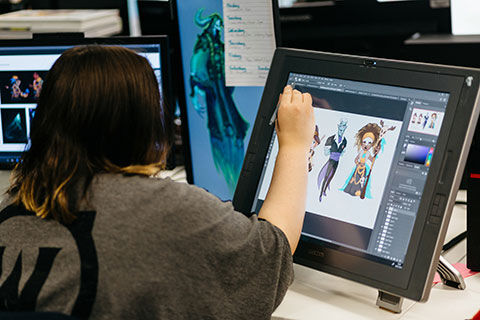
Filmmaking - BA (Hons)
Currently viewing course to start in 2026/27 Entry.
Our cutting edge BA (Hons) Filmmaking degree course will develop your skills across key filmmaking debates and practice conventions. You will be taught by noted film scholars and established practitioners, who will provide their knowledge of international film criticism and filmmaking perspectives....
- Level Undergraduate
- Study mode Full Time
- Award BA (Hons)
- Start date September 2026
- Subject
- Location City Centre
This course is:
Available with Professional Placement year
Open to International Students
Overview
Our cutting edge BA (Hons) Filmmaking degree course will develop your skills across key filmmaking debates and practice conventions. You will be taught by noted film scholars and established practitioners, who will provide their knowledge of international film criticism and filmmaking perspectives.
The course is designed to equip graduates with the theory, practice and industry trends that will enable them to succeed in a rapidly changing film environment.
BA (Hons) Filmmaking and BSc (Hons) Digital Film Production students took part in a shoot for the documentary feature 'Somewhere in La Mancha' in studio B on 9 and 10 November. Utilising the new motion control rig, The Bolt, students helped capture key scenes for the documentary which explores how The Birmingham Royal Ballet and Artistic Director, Carlos Acosta, produced a new version of the classic ballet, Don Quixote through one of the most challenging times, during the Covid pandemic.
What's covered in this course?
The course consists of a wide range of filmmaking conventions, from theory, practice and industry perspectives. Not only will you gain an understanding of Hollywood cinema conventions (from silent movies to modern blockbuster spectaculars), you will apply these to a variety of production scenarios and be enriched by exploring international film storytelling techniques.
A key focus of the course will be on the aesthetic and creative aspects of filmmaking, with consideration being given to both mainstream and experimental modes of film creation, as well as how these traditions are mediated by differing production and postproduction techniques. Whilst theoretical and practice based considerations of filmmaking techniques remains a central focus to the the award, the course also provides modules on on film festival programming and film entrepreneurship, which help provide core skills relevant to the film industry.
How you will learn
You will be taught in a range of lectures, seminars, writing workshops and production sessions, while regular film screenings help you contextualise cinema traditions against your own script creations.
Your formal studies will be enhanced by the possibility to work on a range of external events, such as the Cine-Excess International Film Festival, and assisting on commercial projects in our industry standard studios, whose clients have included the likes of Sony, Disney, Channel 4 and Jaguar Land Rover.
Professional Placement year
This course offers an optional professional placement year. This allows you to spend a whole year with an employer, following successful completion of your second year, and is a great way to find out more about your chosen career. Some students even return to the same employers after completing their studies.
If you choose to pursue a placement year, you will need to find a suitable placement to complement your chosen area of study. You will be able to draw on the University’s extensive network of local, regional, and national employers, and the support of our Careers teams. If you are able to secure a placement, you can request to be transferred to the placement version of the course.
Please note that fees are payable during your placement year, equivalent to 20% of the total full-time course fee for that year.
I’ve enjoyed the flexibility of the course. It’s well balanced between theory-based lectures and practical workshops. I’ve also loved the enthusiastic support from my lecturers. Everyone was really friendly and enthusiastic to work together.
Mariel Panganiban
Why Choose Us?
- We’re ranked top 10 in the UK for Film Production and Photography for three consecutive years (Guardian League Table 2026, 2025 and 2024).
- The course combines practice, theory and industry approaches to filmmaking, alongside training in film festival programming techniques.
- You will be taught by noted film professors, cinema scholars and established screenwriters. Staff on the programme work together to ensure that you receive a balanced understanding of theory, practice and industry skilling relevant to the field.
- You’ll have the opportunity to enhance your industry awareness by getting involved with our Curzon Street Studios team in a wide range of production and film projects, including working on gigs and commercials for professional football clubs and high-profile industry giants such as Sony, Disney and Microsoft.
- You will also have the opportunity to work on big film projects. A recent production completed by BCU student, Jacob McClean, won Best Student Film at Worcester Film Festival for the award-winning film Whistling Dixie (2024) and another BCU student, Pauliina Leskinen, who won Raindance Short film contest for the award-winning Loveshots (2023) and was also a BFI Future Film Festival Nominee for Best Micro Short.
- You will have access to film collections that will enrich your course of studies. These include the Cult Film Archive, a collection of 4,000+ resources (including films, screenplays and promotional materials) that have been donated directly from leading filmmakers and distribution companies in the field.
- We have a partnership with BFI, which offers students free access to the BFI player and research, work placement and masterclass opportunities.
Similar Courses
Open Days
Join us for our next Open Day where you'll be able to learn about this course in detail, chat to students, explore our campus and tour accommodation. Booking isn't open for the next event yet. Register your interest, and we'll let you know as soon as booking goes live.
Next Open Day: Friday 26 June
Entry Requirements
Essential requirements
Standard offer: 112 UCAS Tariff points. Learn more about UCAS Tariff points.
Accelerate offer: 80 UCAS Tariff points. Find out more about BCU Accelerate.
As creativity is an important part of this course, you are expected to submit a portfolio as part of the selection process. This is your opportunity to show your ideas and skills to our tutors.
If you are not studying a creative subject at Level 3, you can still apply for this course. Our portfolio guidance information includes alternative options for how you can show us your passion for art.
If you have a qualification that is not listed, please contact us.
Fees & How to Apply
UK students
Annual and modular tuition fees shown are applicable to the first year of study. The University reserves the right to increase fees for subsequent years of study in line with increases in inflation (capped at 5%) or to reflect changes in Government funding policies or changes agreed by Parliament. View fees for continuing students.
(↩Back to price) * The Government is proposing to apply an inflationary increase to regulated tuition fees for 2026/27 and the University is planning on increasing fees to that maximum level once confirmed.
International students
Annual and modular tuition fees shown are applicable to the first year of study. The University reserves the right to increase fees for subsequent years of study in line with increases in inflation (capped at 5%) or to reflect changes in Government funding policies or changes agreed by Parliament. View fees for continuing students.
Award: BA (Hons)
Starting: Sep 2026
- Mode
- Duration
- Fees
- Full Time
- 3 years
-
TBC
Guidance for UK students
UK students applying for most undergraduate degree courses in the UK will need to apply through UCAS.
The Universities and Colleges Admissions Service (UCAS) is a UK organisation responsible for managing applications to university and college.
Applying through UCAS
- Register with UCAS
- Login to UCAS and complete your details
- Select your course and write a personal statement
- Get a reference
- Pay your application fee and submit your application
Guidance for International students
There are three ways to apply:
1) Direct to the University
You will need to complete our International Application Form and Equal Opportunities Form, and submit them together with scan copies of your original academic transcripts and certificates.
2) Through a country representative
Our in-country representatives can help you make your application and apply for a visa. They can also offer advice on travel, living in the UK and studying abroad.
3) Through UCAS
If you are applying for an undergraduate degree or a Higher National Diploma (HND), you can apply through the UK’s Universities and Colleges Admissions Service (UCAS).
You can request a printed form from your school or nearest British Council office. You will be charged for applying through UCAS. Birmingham City University’s UCAS code is B25 BCITY.
Personal statement
The personal statement gives you a crucial opportunity to say why you’re applying and why the institution should accept you.
Here are the three areas you’ll need to address:
- Why do you want to study this course or subject?
Here’s where you explain what makes this course exciting to you. Think about your motivations for studying the course and your future plans. If you’re planning to take a year out, don't forget to give your reasons.
- How have your qualifications and studies helped you to prepare for this course or subject?
This is your chance to show what you’ve learned at school or college. You should include the skills and knowledge you’ve gained from education or training and how this will help you succeed in your chosen course.
- What else have you done to prepare outside of education, and why are these experiences useful?
Not everything you’ve learned comes from the classroom. Life experience counts too! You might want to talk about work experience, employment, or volunteering and how they’ve helped you develop the skills needed for your chosen course or future career.
Worried about Personal Statements?
If you've got no idea where to start or just want to check you're on the right track, we’ve got expert advice and real examples from our students to help you nail your personal statement. You can even download our ultimate personal statement guide for free.
Course in Depth
First Year
In order to complete this course a student must successfully complete all the following CORE modules (totalling 120 credits):
This module introduces you to Hollywood film through its early, classical and post-classical traditions. The module is structured around the examination of these three stages of development, with a range of debates that also allow you to evaluate American cinema through its stylistic, generic, industrial and historical features.
Looking at forms in films, students will learn how visual languages are being used and how to compose shots that are translatable to other mediums such as animation. You will learn to storyboard and create effective animatics and to succinctly convey ideas and vision to produce short a film(s) as a group and individually. Expect to pitch your ideas individually and as a team.
This module reviews today’s global film marketplace, examining the scale, scope and structure of this multi-billion dollar industry. The aim is to help you navigate the current and emerging landscape for film, in a rapidly evolving industry, developing your appreciation of key players, the impact of the global market on the value chain and sustainability of the sector in consideration of social, cultural, economic and political influences.
A key aspect to understanding filmmaking, is the actual process. This module will provide you with an introduction to conventional filmmaking techniques, such as lighting, camerawork and sound recording. This also includes an introduction to pre-production operations. This will be in the form of visual and sound acquisition techniques, as well as strategies to plan for this. You will be expected to operate a range of equipment, reflecting typical processes to do with narrative and documentary filmmaking. This foundation can be built upon to support future production endeavours.
In this module you will explore the development of the film and television documentary by critically investigating the medium through a range of lectures, readings and screenings, and applying this to produce your own short documentary. We will consider different genres of documentary, such as direct cinema, mockumentary, investigative, ethnographic, docu-soap, experimental, docu-drama, reconstruction and the music documentary, as well as some of the contemporary issues facing documentary film makers. We will engage with a variety of academic debates that relate to the documentary, which include realism, representation, ethics and ideology, and the social, political, economic and technological contexts in which documentary can be critically located.
Second Year
In order to complete this course you must successfully complete all the following CORE modules (totalling 80 credits):
This module will examine the role film festivals play in garnering critical acclaim, enabling audience access and acting as a trade hub for film, playing a part in the financing, distribution and marketing of independent titles. The aim is to unpack the culture of film festivals from the lavish, major international affairs through to grassroots events. You will examine the drivers, objectives and investment that underpins them and their strategic importance for relationship building, launching and generating PR for film.
This module follows on from the first year module and helps move you further towards your professionalism. Whereas introduced you to fundamental operations, this module introduces you to ways in which you can utilise filmmaking equipment to consider and enhance the aesthetics of production. Through the study of Light, Colour, Area, Depth, Time, Movement and Sound, you will be expected to consider these as a way to further enhance your production skills.
The module is an opportunity to learn and critically reflect on the skills of collaboration by enabling you to create an interdisciplinary project with students from complementary disciplines, or with academic staff. Collaboration is a vital employability skill within the Creative Industries and this module allows you to develop these skills, making use of University facilities and with the support of academic staff. Within this module framework, several kinds of collaborative opportunities are available. For example, with the approval of your supervisor, you can determine a project based on your own interests; your supervisor may set you a predetermined project to enable you to work with other students in a way that is appropriate to your subject area; or there may be opportunities for you to collaborate with staff on research projects. In all cases, you must apply your subject skills to an interdisciplinary project which will be agreed in advance with your supervisor.
In order to complete this course you must successfully complete at least 40 credits from the following indicative list of OPTIONAL modules.
This module will provide students with an overview of the cultural relevancy of 1970s cinema. Initially exploring the context of the decade and the fragmented nature of film narratives at the time the module will discuss the emergence and demise of ‘American New Wave/New Hollywood’ but also explore further the style, substance and aesthetics of the varying sub-genres of the time as well as the cultural and creative impact they had on both cinematic presentation and other aspects of the media industry.
This module offers an introduction to some of the ongoing academic debates on media fandom and subcultures. This is a broad-ranging topic, and as such in this module it will be primarily be considered from an audience and reception perspective, including your own. You will have opportunities to interrogate your own fan and/or subcultural identity in class and your own participation in fandoms and subcultures will form a part of class discussion and analysis.
This module follows on from the year one Foundations of Filmmaking, but introduces you to the key elements of cinematography in greater detail. Whereas Foundations of Filmmaking introduced you to fundamental, wider aspect of production and associated operations, this builds upon these, yet purely focusses on the duties within the field of cinematography.
This module will teach you the essential skills of, and principles behind, the writing of short films. Although these principles apply primarily to screenwriting for film and television, this module will instead be concerned with the writing of short films. You will study a number of freely available short guides to screenplay layout and formatting and be trained in the practical application of screenplay formatting software. You will write three short scripts, given as fortnightly writing exercises, and receive detailed formative feedback on one of the scripts, which you can use to improve and develop your work for your final portfolio. You will focus on visual storytelling, layout conventions, and the issue of writing to scale (budget). You will also be encouraged to analyse, but also critique, dramatic construction in terms of character function, motivation and genre.
Core modules are guaranteed to run. Optional modules will vary from year to year and the published list is indicative only.
Final Year
In order to complete this course you must successfully complete all the following CORE modules (totalling 80 credits):
This Module focuses on the post production element of filmmaking. Specifically areas concerning editing techniques, colour correction and grading to aid narrative. Students will learn both the technical skills of audio and video editing as well as the grammar and structure that belong to the art in order to become better storytellers.
The purpose of the module is to enable you to undertake a sustained, in-depth and theoretically informed research project exploring an area that is of personal interest to you. It is important that we can support you appropriately, so you will be guided towards choosing a research topic which is relevant to your discipline and in which your lecturers have expertise. The outcome may take the form of a written dissertation or a practice-based portfolio.
In order to complete this course you must successfully complete at least 40 credits from the following indicative list of OPTIONAL modules.
This module examines the intricacies of film and entertainment finance at product level, unpacking how films are made and how they raise their finance. The aim is to help you understand sources of finance, how finance and recoupment plans are put together and what it takes to attract investors to a project; the typical challenges faced by a producer.
You will explore key players in the film financing and sales process (sales agents, distributors, and exhibitors) looking at money flow, the kinds of deals being made and how the film business operates.
Sessions will comprise a combination of seminars to introduce module content, and discussion-based activities to support you in exploring the current and emerging marketplace/financing landscape. This will provide opportunities to discuss theory as it applies to current practice, and the challenge of putting together a film development package to attract investment.
The module is an opportunity to learn and critically reflect on the skills of collaboration and/or your own professional practice. The module enables you to create either an interdisciplinary project with students from complementary disciplines or your own self-defined project.
The module introduces you to the key debates related to the study of global cinema traditions, which have emerged over the last twenty years as a distinct aspect of critical interest within film and media theory.
The module begins by examining key concepts associated with the study of global film, before situating these film patterns in their cultural, historical and transcultural contexts. The module goes on to offer a series of case-studies of nationally defined cinema movements that also situates these patterns through the key output of directors and performers These national cinema movements will be complimented by a further range of case-studies drawn from Europe, Central America, Africa and the Arabic regions. Other topics that the module explores include representations of gender and sexuality within global cinema traditions, as well as considering the importance of transnational debates and popular film traditions to debates in this area.
Core modules are guaranteed to run. Optional modules will vary from year to year and the published list is indicative only.
Download course specification
Download nowDuring the first year of the BA (Hons) Filmmaking course, you will be introduced to key film debates and production practices through modules such as Foundations of Filmmaking.
This unit starts from the very beginning, and your skills will be further expanded through the module Hollywood: Early Film to Blockbusters, which considers the filmmaking conventions in a range of Hollywood film formats, while the global industry is explored through the Film industry Primer module that is also undertaken in this first year of study. Alongside a focus on U.S. based filmmaking practices, the Documentary: Theory and Practice module, also undertaken in the first year, offers you the opportunity to create your own short films based on documentary techniques in the field.
The second year of the course lets you expand your knowledge of filmmaking conventions through more detailed modules such Filmmaking Practices. As well as being able to undertake a range of optional modules around topics such as Screen Cultures, Cinema of the Seventies and Foundations of Screenwriting, this second year of study also provides a dedicated module on Festival Festivals, which outlines the key industry skills required to stage cinema events. During the final third year of study, your knowledge of filmmaking considers both post-production techniques and national cinema traditions. A module on Postproduction Techniques considers a range of mainstream and experimental practices of cinema, while the importance of both non-Western and subcultural traditions of film can also be explored. In addition, an optional module on Film Finance & Entrepreneurship allows you to assess key business practices that are relevant to the current cinema industry. This range of optional modules allows you to tailor the course to perfectly suit you.
As the culmination of your final year of study you will also undertake the Major Project module, which allows you to carry out an independent study of an aspect of cinema theory, film practice or an industry convention that has interested you as a result of your studies on the BA (Hons) Filmmaking course.
Further study
For successful graduates there is a natural progression from the BA Filmmaking to the MA Film Distribution and Marketing focused on nurturing entrepreneurial producers and distributors, MA Feature Film Development focused on preparing a film for pitching to potential investors, or MA Future Media focused on exploiting digital media and marketing opportunities through emerging technologies and advertising agency techniques.
Take a look at all the Film, Animation and Photography postgraduate courses available.

Employability
The BA (Hons) Filmmaking course is located within the College of Digital Arts, which has an excellent track record for graduate employment.
The course opens avenues for students interested in a wide variety of roles associated with film and across the broader creative industries. You can also gain employability skills through our Graduate+ programme, which will help enhance your employment options by helping with careers development, employability activities, volunteering and part-time work experience.
This is furthered by the access you have to a range of support staff and services from the University’s Careers Service.
Placements
During your second year, you will have the opportunity to work as part of a mixed discipline team to respond to a brief, as part of an in-house placement element of the course.
Facilities & Staff




This course is based in the Curzon Building, a £63 million development, located on our City Centre campus.
We help you learn a specific discipline such as digital marketing, programming or art and put that discipline into practice by offering flexible teaching space, dedicated development studios and open access work areas for group projects, as well as course-specific facilities.
Our staff
Ben Young
Senior Lecturer and Course Director, BA Filmmaking
Ben is a practice-led filmmaking academic with ongoing output as a producer, writer, and director across fiction, creative documentary, hybrid, and experimental cinema, with a further professional background in theatre, brand content, and development producing. His long and short form works have premiered and been distributed across major film...
More about BenJoe Miles
Course Leader BA (Hons) Photography
Specialising in commercial and editorial photography for national and international clients, Joe currently leads the BA (Hons) Photography and BA (Hons) Fashion Imaging courses. Experienced in both film and digital photography he has worked with RED cameras, combining moving and still imagery. His extensive list of clients include:...
More about JoeRebecca Tullener
Senior Lecturer in Film
Rebecca has a commercial background in web, graphic design and video production, joining Birmingham City University back in 2003 to deliver on European funded projects supporting small businesses with screen-based technologies. The role involved strategizing and overseeing the development of websites and branded content. Rebecca went on to run a...
More about RebeccaMatt Cusworth
Lecturer in Film
With eight years working in the industry, Matt’s television and film credits include Casualty, Dalziel and Pascoe, Cold Blood, Down To Earth, Footballers Wives, Doctors, Judge John Deed, The Libertine, The Shell Seekers, Sex Lives of The Potato Men and Grease Monkeys. Working initially as an assistant director and stand-by prop man for the BBC,...
More about MattSteven Chamberlain
Lecturer in Film and Animation
Steven Chamberlain is a lecturer in film and animation. Steven trained as a painter at Central Saint Martins and continued painting for a number of years before becoming a multimedia designer and artist, creating interactive audio visual, installations and projection events.
More about Steven


















